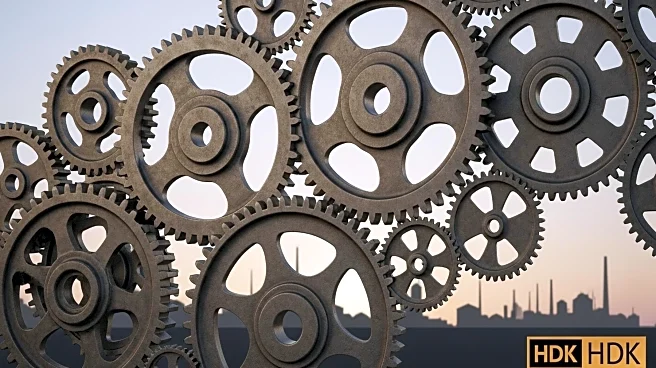What is the story about?
What's Happening?
The European Union has proposed a significant reduction in its tariff-free quota on steel and steel products, effectively imposing large tariffs on imports from countries such as China, India, Turkey, and the United Kingdom. The new proposal suggests a 50% tariff on imports exceeding a quota of 18.3 million tons, doubling the current rate. This move aims to protect Europe's traditional steel manufacturers from global overcapacity and the diversion of imports due to high American tariffs. The proposal requires steel importers to declare the origin of their products and introduces a complex quota system. The European Parliament and the European Council must ratify or amend the proposal, which may also involve negotiations with the World Trade Organization.
Why It's Important?
The proposed EU tariffs could have significant implications for the UK steel industry, which exports a substantial portion of its products to the EU. The UK Steel trade body has expressed concerns that the new tariffs could devastate the British steel sector, potentially redirecting millions of tons of steel towards the UK from countries affected by the tariffs. This situation poses a risk of a trade war, which could be detrimental to both UK and EU steel industries. The proposal highlights the ongoing challenges of global steel overcapacity and the need for strategic trade policies to protect domestic industries.
What's Next?
The proposal is subject to ratification by the European Parliament and the European Council. Discussions between the UK and the EU are ongoing, with UK Prime Minister Keir Starmer indicating that negotiations are underway. The outcome of these discussions will be crucial in determining the future of the UK steel industry and its relationship with the EU. Additionally, the proposal will be a topic of discussion at an upcoming meeting of trade ministers from the Group of 20 countries in South Africa.
Beyond the Headlines
The EU's move to impose tariffs on steel imports reflects broader concerns about global trade imbalances and the need for strategic autonomy in key industries. The proposal underscores the importance of the steel sector to the EU's economic security and competitiveness. It also highlights the potential for trade tensions to escalate, affecting workers and industries on both sides of the English Channel. The situation calls for collaborative efforts to address global overcapacity and ensure the sustainability of the steel industry.
















